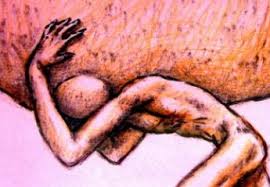This guest post is by Peter Sheath, another good friend, who, like Matt, I’ve only met in the flesh for a few hours. Peter knows a great deal about addiction and rehab. Here’s what he’s got to say about power and powerlessness…
I have been student of addiction for many years. Much of it involving the personal and, sometimes, painful elements of self-experimentation. I’ve talked to thousands of people and I’ve experienced the privilege, honour and genuine unfettered pride that comes when a person decides to trust me and invites me to share some of their journey. There is something very special that inhabits almost everyone I have come across who struggles with addiction. I see it in their art, I feel it in their performance. Read anything by Hemingway, The Old Man and the Sea in particular, or watch a Tennessee Williams play. Watch Philip Seymour  Hoffman as he steals the show. Working with addicts, when you are really with them, is much the same. It’s almost as if they have a magnifying glass attached to them that blows up every little human characteristic to an almost unbearable level of magnitude. Beyond all the ego, bravado, and defiance are, almost always, frightened children. Who have lost their way and come to rely on the predictability of substances. Until they’re ready to move on.
Hoffman as he steals the show. Working with addicts, when you are really with them, is much the same. It’s almost as if they have a magnifying glass attached to them that blows up every little human characteristic to an almost unbearable level of magnitude. Beyond all the ego, bravado, and defiance are, almost always, frightened children. Who have lost their way and come to rely on the predictability of substances. Until they’re ready to move on.
To try to work with these people I firmly believe that I have a professional responsibility to work with myself. I need to be able to see beyond the narcissism of self and meet them exactly where they’re at without wanting to control them. In a line from a song, Willie Mason says, “It’s a hard hand to hold that’s looking for control.” That reinforces the idea that, if I do not have the presence to meet someone and accept them as they are, I shouldn’t bother meeting them in the first place. I have found, through bitter experience, that if I’m not with them it becomes my space that I’m working in. A space often populated by my dark side: a space I need to control.
Unfortunately many of the people working in treatment do not see any need for self-reflection and continued self-development. They have come to believe that they simply don’t have time. I’ve travelled all across the UK, delivering training, coaching and consultation, and it’s the same everywhere. Blame, intimidation, threats and arrogance become the tools of rehab, the vehicles of control. It’s just easier that way.
During a training session I was delivering a couple of weeks ago, one of the delegates said that the training was great but how was she supposed to do it when she had 70 people on her caseload? She was genuinely upset and was expressing her sense of being overwhelmed by the situation. I invited her to just take a step back, consider the situation as an observer, and  try to see the 70 people as 70 individual opportunities for change. I said that each of those 70 people had the propensity to take responsibility for their own lives, begin to address the risks they were currently involved with, make some decisions and commit to actions to help with their wellbeing. Not rocket science, but it really did help her to see the situation differently, and to realise that, by approaching her work in a different way, by handing over responsibility, she may have a lot less to carry on her own shoulders.
try to see the 70 people as 70 individual opportunities for change. I said that each of those 70 people had the propensity to take responsibility for their own lives, begin to address the risks they were currently involved with, make some decisions and commit to actions to help with their wellbeing. Not rocket science, but it really did help her to see the situation differently, and to realise that, by approaching her work in a different way, by handing over responsibility, she may have a lot less to carry on her own shoulders.
Unfortunately, and here’s the rub: when we have absorbed the ideology that addiction is a disease and we need to sort it out or cure it, we are unknowingly removing from the person the very thing that is going to get them well. By assuming the “expert” status we are telling  people that they are sick and, as such, unable to take responsibility for their recovery. Walk into any treatment centre anywhere and suddenly you become completely incapable. You can’t even fill in a form yourself and you certainly have no capacity or competence to manage your medication. Even if you begin to take responsibility by getting honest and telling the workers you have used again, they will need to take a confirmatory drug test to prove it! “You will need to undergo an assessment, looking at everything that’s wrong with you…” Using a form filled out by a worker, because you can’t do it yourself. The process is repeated by any further “expert” you may need to see. Any initiative on your part will be viewed the same way: as an obstruction. If you don’t want a script or you want to go straight to detox, you will be met with, “you’re not ready for that yet”, or the classic, “people die doing it that way.”
people that they are sick and, as such, unable to take responsibility for their recovery. Walk into any treatment centre anywhere and suddenly you become completely incapable. You can’t even fill in a form yourself and you certainly have no capacity or competence to manage your medication. Even if you begin to take responsibility by getting honest and telling the workers you have used again, they will need to take a confirmatory drug test to prove it! “You will need to undergo an assessment, looking at everything that’s wrong with you…” Using a form filled out by a worker, because you can’t do it yourself. The process is repeated by any further “expert” you may need to see. Any initiative on your part will be viewed the same way: as an obstruction. If you don’t want a script or you want to go straight to detox, you will be met with, “you’re not ready for that yet”, or the classic, “people die doing it that way.”
In fairness, it is beginning to change, but I believe that change needs to begin with the workforce. It needs to begin with an admission that we’ve got it wrong. Then recovery can become a team process that includes the person doing the recovering.
Please note that we have a new Guest Memoir. Click the link above and check it out. Send in one of your own. These are potent, personal, and searingly honest portraits of the struggles and triumphs of addiction.

Leave a Reply